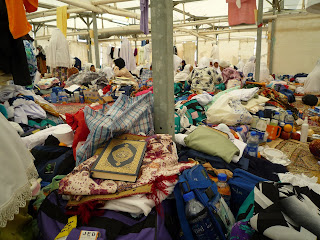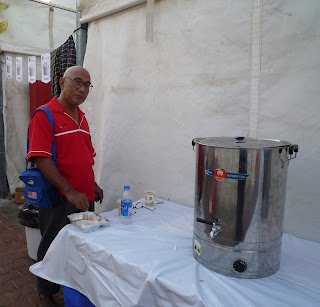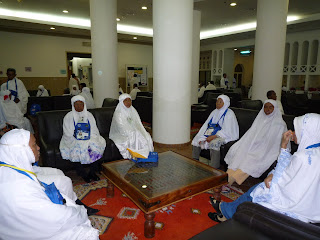 The Jamrah as it is today
The Jamrah as it is today The Jamrah in the 70s
The Jamrah in the 70s The Jamrah in the 50s
The Jamrah in the 50sDay Three (cont'd)
It was a bleak start to Day Three. With one lens missing and a nagging headache that persisted despite medication, I decided the safest recourse would be to remain in the tent, and say my prayers and doas.
As the day progressed, it was one misfortune after another. As if losing the lens of one’s spectacles wasn’t enough, my all-important Pilgrim Identification Tag and a brand new pair of flip-flops purchased just the day before to replace a ruined pair of leather sandals, also disappeared.
Without glasses I was as good as blind; without the tag I was a Tabung Haji non-entity. I could very well be left sick and penniless too, for only the tag could be used to seek medical treatment and to withdraw Tabung Haji savings while on pilgrimage.
For the uninitiated, Tabung Haji's functions in Mina were minimal; the bulk of the Hajj operations with regards pilgrim management were handled by Saudi Arabia's Muasasah Office.
The said Office also undertook provision of meals to Nusantara pilgrims. However, I must add (without malice, that is) that Tabung Haji-appointed caterers in Makkah and Madinah did a much better job in terms of food quality.
While in Mina, Tabung Haji was only allowed to offer medical and religious advisory services to Malaysian pilgrims; as such I had to wait until we return to Makkah to have a new tag done.
By noon, my headache had mercifully gone. With that, the gloom lifted. Myopia notwithstanding, I felt a lot happier. “Submission to the will of God” found a new meaning that day. It must be said that acceptance of one’s fate was a lot easier in the Holy Land.
God never felt closer and more real. Alone in my corner of the tent offering prayers and supplications, I was imbued with calmness and tranquility. It was a most peculiar, yet pleasing, feeling.
I would like to believe that Mina was where my spiritual journey reached its zenith. No word could explain how I felt. It is still impossible for me to translate this emotional intensity into mere words. Suffice to say the ‘rahmat’ (blessing) felt tangible, something you could physically hug and hold.
Stoning the devil was a foregone conclusion; I would be an unmitigated fool to attempt it in my current state of myopia, when I could hardly see the earth under my feet.
Anyway, the ritual is 'wajib' (must-do, with options) and not 'rukun' (pillar, some with options as well). Although a ‘must-do’, it is one that can be entrusted upon another person (like I did with Pak Abu), failing which one has to pay ‘dam’ (a pre-determined sum as penalty).
There were movement aplenty within the tents that day , with many pilgrims packing to return to Makkah after two nights in Mina. These pilgrims had opted for Nafar Awwal (literally, “to leave earlier”), thus must be out of Mina's boundary before dusk.
[Note: Nafar Awwal is when pilgrims complete two days of stoning and then opt to leave Mina to return to Makkah, which they must do before sunset. Those staying for the full, prescribed three days in Mina are deemed to have opted for Nafar Tsani]
The Nafar Awwal option was not encouraged by Tabung Haji; I think it was more of a logistic issue than anything else (the lack of adequate transport had a lot to do with it). Still, Tabung Haji did arrange for buses to carry the early leavers back to Makkah.
Although announcements were made about the availability of buses and departure times, some pilgrims still hauled their luggage and parked themselves at the camp gate, causing mini-congestion at the entrance.
Many pilgrims were eager to leave the discomfort of Mina for Makkah, thus the Nafar Awwal rush. On the other hand, I had this sudden urge to stick around in Mina a while longer.
Pak Abu agreed Mina had taught many good lessons. If one could look beyond the physical discomforts – the overcrowded tents, the lack of toilets, the throngs, the constant clamour and din, the barely-palatable food – Mina was a paradise, spiritually. Mina was proving to be one heck of a memorable sojourn.
Day Four
Thursday the 11th of December was a bright new day. A beautiful day too. The bus taking us back to Makkah would be leaving at 10 in the morning, giving me ample time to pack and say my goodbyes to new friends made in Mina.
As I looked around the tent, now half empty, with many pilgrims gone the day before, I felt a twinge of sadness and melancholy. After the torment of Arafah, I had not expected to be severely tested yet again in Mina. But He knew best, and that was good enough for me.
After all, the Hajj is a 'jihad' and its rewards commensurate with the level of hardship and suffering one is subjected to. I know He loves this humble servant still. Thank You, God.






































